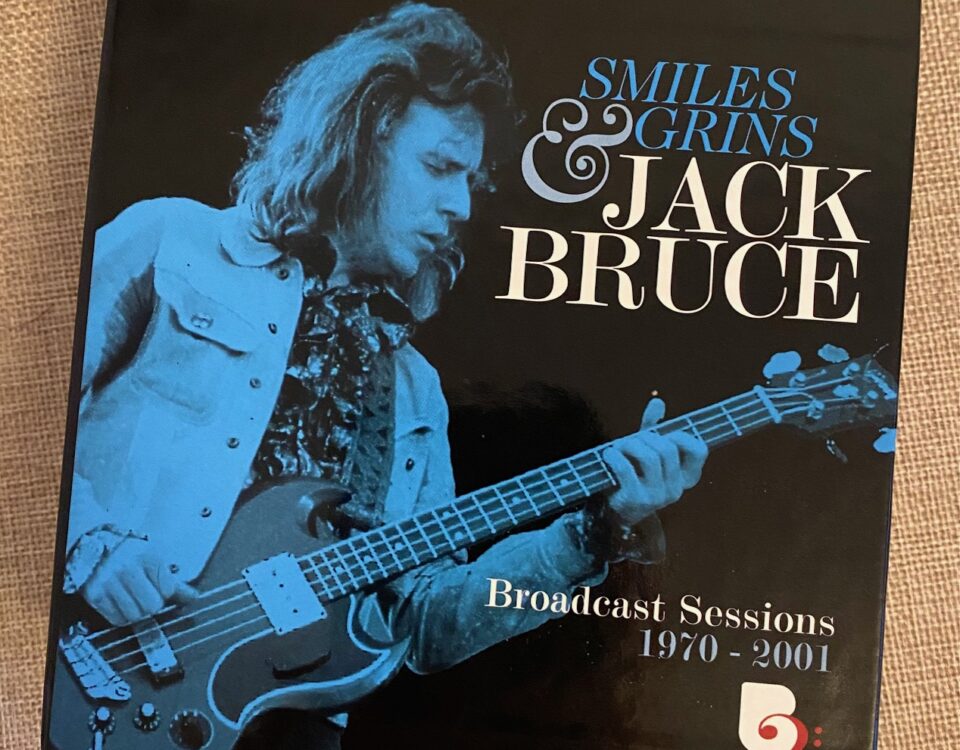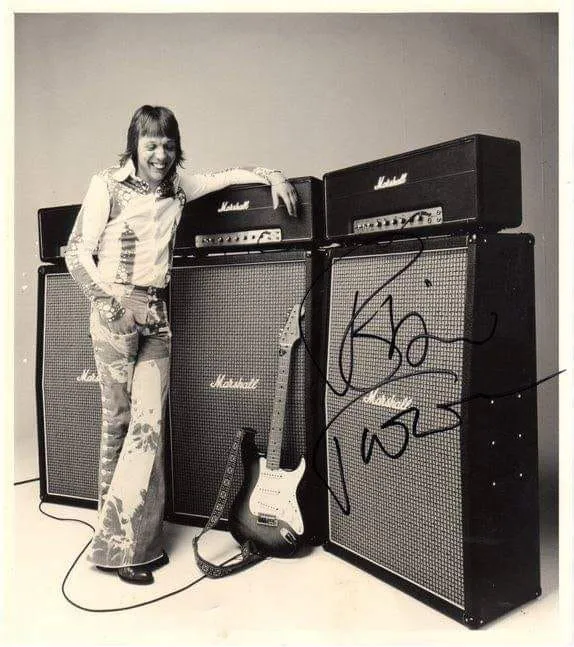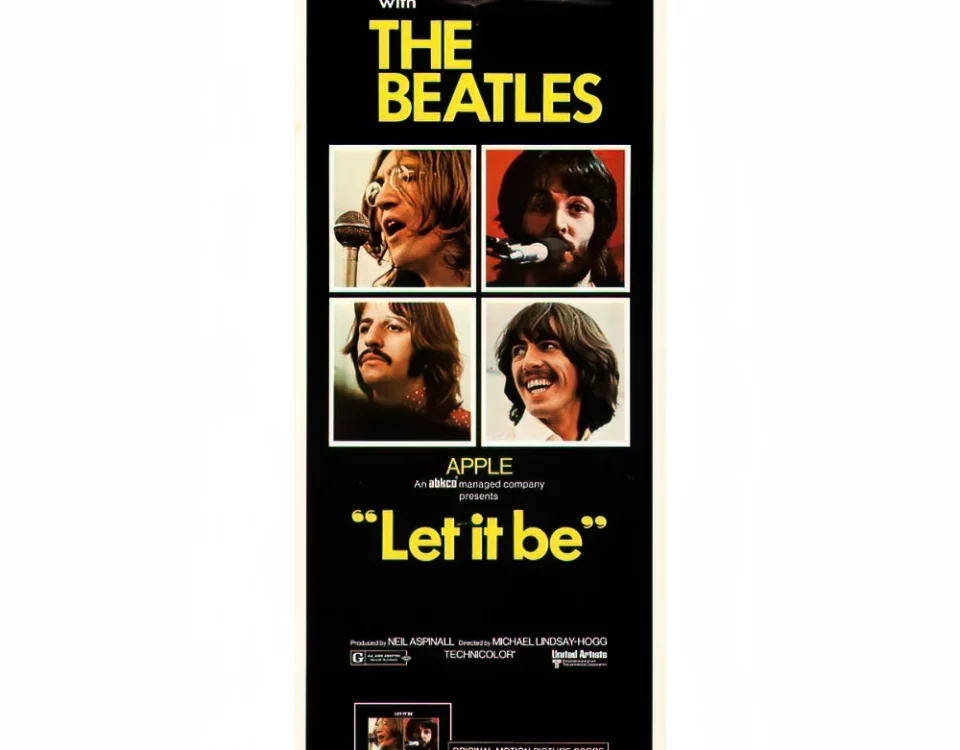Lunar Landings
Tracing the arc of momentum for talented, rising bands can sometimes result in curious paths being on display. Some bands simply skyrocket upwards, while others leave evidence of fits and starts. The latter is the case with Gibbous Moon.
Gibbous Moon is not a supergroup, a by-now-watered-down hyperbolic term that is usually a kiss of death anyway. But it is a power trio of unquestionable pedigree and reputation as individuals.

Saturn V album art portrait of Gibbous Moon. Photo and image creation: Dan Long
Bassist/vocalist Noelle Felipe worked in highly regarded Philadelphia bands including Dr. Bombay, The Friggs, and Pink Slip Daddy, often spinning in the same orbit as music luminaries Palmyra Delran and Ben Vaughn. Drummer Michael Mosley drove the hyper-grunge of Philadelphia’s Shemales, at the beginning of an enviable track record that has provided power percussion to an array of bands and projects. Meanwhile, Mauro Felipe, familiarly known as Moe, was sailing heavy guitar waters in New York, via stints in bands like Atomic Number 76 and Wrecketh.
Gibbous Moon began to set off seismic impacts from their first gigs in the Philadelphia area in 2016 and 2017. Their trajectory was soon quickly accelerating, urged along by excited word of mouth and strong press notices – including a major feature in one of the United States most respected and significant newspapers, the Philadelphia Inquirer. Gibbous Moon even began to rise in fertile realms outside of their home base, most significantly in New York City.
And then, just as the buzz was getting louder, the volume began to drop. For any band with members not making a living from their project, the travails of life can always bring interference to the creative effort. And let’s not forget the biggest disruption imaginable – a deadly pandemic which, as we all know all too well, was the biggest creative disruptor we’re likely to see in our lifetimes.
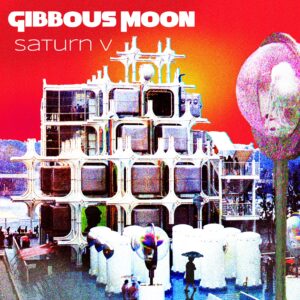
Gibbous Moon album Saturn V front cover. Art: Noelle Felipe
But Gibbous Moon persevered. Unable to pursue their on-stage onslaught, the band channeled its energy toward the realization of a major CD release. And now, with Saturn V – an album name inspired by the massively powerful rocket that propelled men to the moon in NASA’s daring Apollo program – Gibbous Moon has initiated their very own launch sequence.
The stage is fully set from the album’s opening notes, “Dourado” boldly established with a propulsive six-string chug before the rhythm section thunders into prominence. Noelle’s confident voice confronts, with hazy answering vocals swirling in the mix. The surge unfolds into a sprawling chorus before the breathless tempo of the verse locks back in hard.
And that’s the secret weapon not just of this opening track but Gibbous Moon’s expansive overall approach. They can be brutally heavy, but they’re not going to stand there like hefty dolts, stupidly bludgeoning your ears. Unexpected sonic turns beckon, psychedelic soundscapes tempt, anthemic passages loom, and you never know just where you’ll end up. In fact, it can be difficult to remember how you reached your current aural coordinates – but you know the journey has definitely been something else.
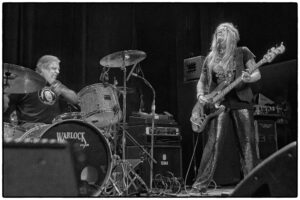
Drummer Michael Mosley and bassist/vocalist Noelle Felipe of Gibbous Moon. Photo: Doug Dresher
Highlights rush by. The ascending guitar architecture that sets up Moe’s closing solo in “Blue Shelby.” The delicious slow bass snarl that heralds the opening of “Sine Wave.” The frantic convulsion of “Follow That Car” and the strutting pulse of “Everything,” with its Mick Ronson-like core riffs. Mosley’s simply cataclysmic drumming in “1972.” And through it all, the complex and enveloping interplay between guitar and bass.

Guitarist Mauro “Moe” Felipe of Gibbous Moon. Photo: Doug Dresher
You can let this force be with you in a torrent of sound pouring from your speakers, or better yet, break out a good set of headphones. By the time you reach the black-hole passage of wild guitar effects in this remarkable album’s final moments, you will be experienced.
Like the phase of the celestial body that provided the band its name, Gibbous Moon is on the rise with Saturn V, positively gaining in brightness – waxing, not waning. The intensity is growing. Take a little trip…


